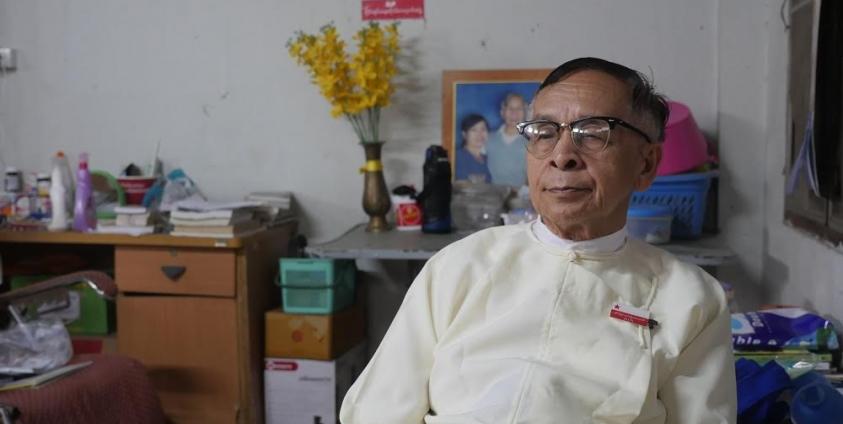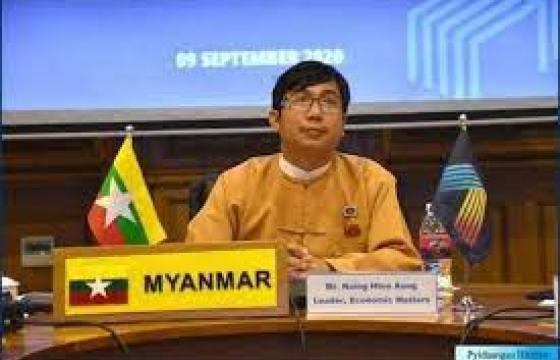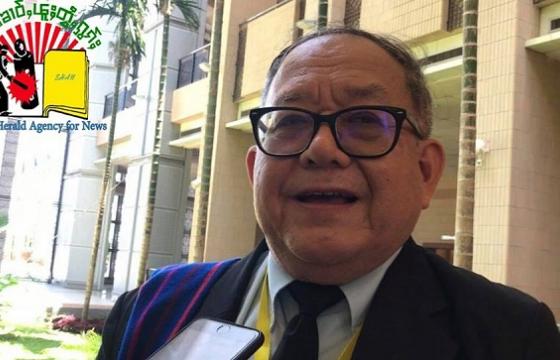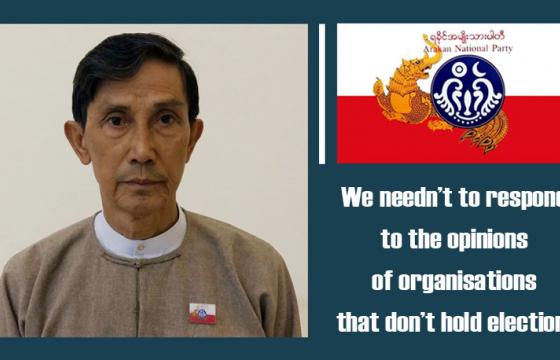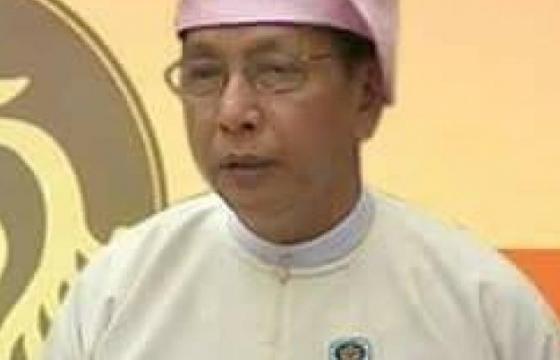The Arakan Liberation Party (ALP) and its armed wing, the Arakan Liberation Army, signed a preliminary ceasefire with the Rakhine State government in April 2012 before joining seven other ethnic armed groups in inking the nationwide ceasefire agreement (NCA) in October 2015.
Nineteen representatives from the ALP are currently attending the second session of the Union Peace Conference, also known as the 21st-Century Panglong Conference, in Nay Pyi Taw.
KIC News sat down with U Khaing Soe Naing Aung, vice chair of the ALP and leader of the ALP’s delegation to the conference, to talk about what the ALP hopes to discuss at the event and what can be achieved through these conferences. This interview has been edited for length and clarity.
Q: Why did the ALP decide to attend the 21st-Century Panglong Conference? What did you do to prepare in advance?
A: The decision to hold the 21st-Century Panglong [Conference] on May 24, 2017 was announced at the JICM [the Joint Implementation Coordination Meeting in April]. This same meeting didn’t allow the ALP to hold a national-level political dialogue, but did allow the RCSS to hold one. They didn’t allow the RCSS to hold [the dialogue] at the venue [of their choice], but instead allowed the RCSS to hold it only within areas under its control where there are just 30 or 40 houses. So the RCSS didn’t hold it. As for the ALP, State Counsellor Daw Aung San Suu Kyi said Arakan State is a sensitive region so it’s not easy to allow us to hold a national-level political dialogue…We submitted our request three times but it wasn’t accepted.
We discussed not attending the conference if political parties and social organizations from Arakan State had no desire to attend it. But, we also knew the other seven signatory groups would be attending the Union Peace Conference.
An emergency meeting of the PPST (Peace Process Steering Team) was held on May 13 and 14. At the meeting, we discussed the need for the NCA signatory groups to present a unified voice, which was hard since the ALP was not allowed to hold the national-level political dialogue. I pressed for us to be allowed to hold the national-level political dialogue in a suitable place since the Union Peace Conference was drawing nearer. The leaders of all eight NCA signatory groups, including the ABSDF (All Burma Students’ Democratic Front), wrote a letter to the State Counsellor. A copy of the letter was also sent to Commander-in-Chief Senior General Min Aung Hlaing. Another copy was sent to the [Peace] committee’s chair. But, this letter hasn’t been answered yet.
[So we thought] what could we submit to the second session of the 21st-Century Union Peace Conference when we couldn’t hold the national-level political dialogue? There’s nothing to submit. We could choose not to attend the conference. But, some ethnic groups such as the Karen, PaO, Chin, and the ABSDF have held their national-level political dialogues so they have something to submit. We [are attending] the 21st-Century Panglong Conference in order to show support for and contribute to the efforts of all ethnic people.
Q: Which topics will the ALP discuss at the conference?
A: As I have said, we have nothing to submit since we have not held a national-level political dialogue…We were told that we could still submit [a paper] from our party. So, I’m thinking about discussing the requirements in establishing a genuine federal Union. There needs to be a distribution of power between the central government and the state governments in a federal Union. When our federal Union is built, it will need to be a genuine federal Union that is built on the desires and views of the ethnic people such as the Shan, the Kachin, the Karenni, the Arakan, and the Mon people.
Q: Among three groups in Rakhine State – the ALP, the Arakan Army (AA) and the Arakan National Council (ANC) – the remaining two groups have not signed the ceasefire. How will the ALP cooperate with them?
A: All stakeholders need to be involved in the conference if they want peace. I have met with Senior General Min Aung Hlaing and the State Counsellor two or three times. The Tatmadaw especially needs to be broadminded. Everyone needs to be involved.
Q: What outcomes can be expected from the Union Peace Conference, or the 21st-Century Panglong Conference, if it does not involve input from all ethnic people? What does the ALP expect?
A: I don’t think there will be a good outcome from the Panglong Conference. Daw Aung San Suu Kyi has said the conference will be held twice a year during her four-year term. The KNPP is not attending it. Other groups might not attend it as well. That’s why the upcoming conference cannot give a beneficial or even comprehensive perspective on nation-building. The eight signatory group will try to approve policies that can be accepted by everyone, while not accepting points or polices that are less commonly acceptable.
What I want to say is that this peace process won’t end quickly. If I were to quote Daw Aung San Suu Kyi, at least 75 percent [of all groups] need to participate. The country can be built if only there is a minimum of 75 percent participation. Burma’s independence was gained with only the Shan, the Kachin, the Chin and the Burmese. Peace wasn’t obtained even though a country was forged.
Q: The 21st-Century Panglong Conference has been criticized for following a roadmap laid by the previous government and the Tatmadaw. What’s your opinion on this?
A: This was pointed out in a speech given by General Mutu Say Poe at the JICM meeting held on April 24. What he has pointed out is true, but I don’t care. I believe we should not act hastily. Unity needs to be built between the NCA signatory groups and the non-signatory groups. If there is unity between the EAOs [ethnic armed organization], they will not cave to international pressure or public pressure [and agree to things that] don’t fulfill our demands…The EAOs need to unite and strive together. Otherwise [peace] will prove elusive.
Q: Critics say that no matter how many political dialogues are held in Myanmar, there is less chance of affecting peace without amending the 2008 Constitution. What’s your view on this?
A: Yes, we understand that every action we make for the peace process under the 2008 Constitution has been met with difficulties. All the eight EAOs who signed the ceasefire understand this. Members of the public who want democracy understand this. The Burmese understand this and other ethnic people understand this. In international experts’ view, the 2008 Constitution is a constitution that protects and prolongs military dictatorship. They have pointed out that we need to try to change it using various methods. These international experts advised us to make changes like what occurred in Indonesia. They told us that we need to make the changes slowly over time. It took over 20 years for Indonesia to gain a civilian government and good governance. Experts have advised us to follow this pattern. It won’t be easy.
Q: What should be done to make the Union Peace Conference all-inclusive?
A: It’s difficult to make it all-inclusive. But we need to start with policies that are accepted by everyone. Then, we need to take the time to negotiate the policies that are not agreed by everyone. We need to use the force of the public and the international [community to our advantage]. The military generals from the Tatmadaw need to relax some of their concerns. If we can do this, [peace] will be closer.
Q: Anything else you want to add about the Union Peace Conference?
A: Decisions on issues that are common understanding between the ethnic people need to be set down at this conference. The public and international countries need to show support. We need to amplify the voice of the CSOs and women. Only then can we mature this process.
Translated by Thida Linn
Edited by Laignee Barron

